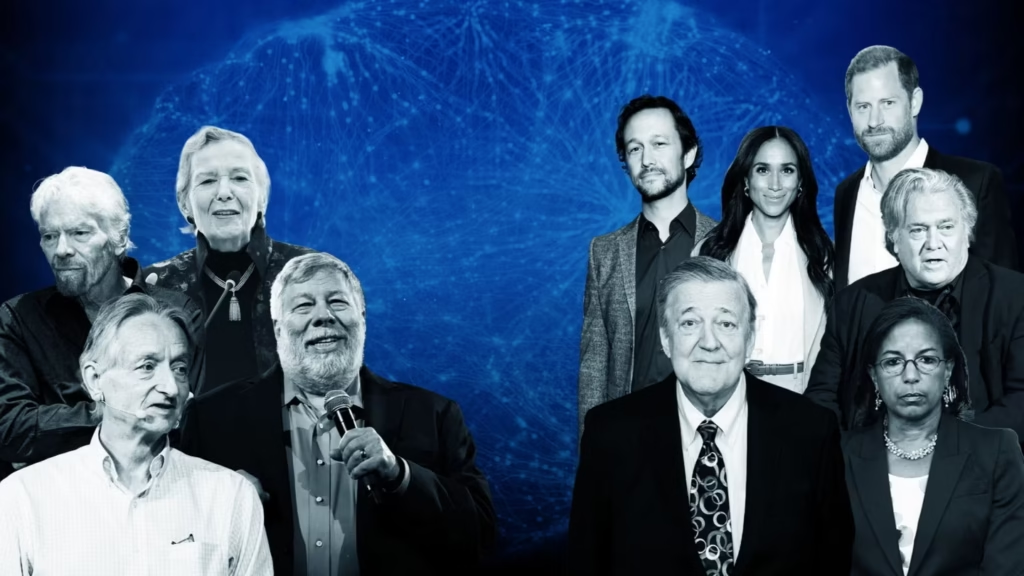In a striking move that spans politics, entertainment and technology, over 800 public figures have joined forces to call for a moratorium on the development of superintelligent artificial intelligence systems. Among the signatories are the contentious American political strategist Steve Bannon and the British-American actress-writer-philanthropist Meghan Markle — two names rarely seen side-by-side in such initiatives.
This coalition reflects a broader unease about what lies ahead if AI continues to accelerate unchecked — not just incremental improvements, but the leap into what many deem “superintelligence”. The sign-on letter highlights the “profound risks” associated with systems that could surpass human cognitive ability and act autonomously in ways we may not anticipate or control.

Table of Contents
Why They Want a Ban
The letter addresses the potentially existential nature of superintelligence. It argues that once an AI system attains human-level intelligence and begins self-improving rapidly, the consequences could include massive societal disruption — unemployment on a scale we’ve never seen, the erosion of democratic safeguards, or even scenarios where human oversight becomes impossible.
The campaigners are effectively saying: “Not just yet”. They are calling for a pause on the training of advanced AI systems while society catches up — regulating, understanding and creating guardrails before things reach a tipping point.
In their own words, the signatories believe we should “place a moratorium on the development of AI systems more powerful than those in operation today” until controls are in place. This reflects a shift from the narrower AI-ethics debates of a few years ago (“bias”, “privacy”, “fairness”) to something much larger: what happens if machines outthink us.
The Unlikely Alliance
One of the most interesting features of this campaign is the variety of voices involved. Steve Bannon — former adviser to US President Donald Trump, a figure strongly associated with populist politics — has signed alongside Meghan Markle, who has been a public figure in progressive, feminist and philanthropic circles. The coming together of such divergent personalities gives this initiative unusual breadth and media pull.
Their involvement suggests that concerns about superintelligence are cutting across traditional ideological fault-lines. Whether you come from the left, the right or somewhere in between, the fear that machines might outpace humanity is reframing how people think about technology governance.
The diverse roster also lends the campaign a mixture of visibility and seriousness. Celebrity names attract attention; technology figures, ethicists and academics provide legitimacy; and this coalition amplifies the call for a meaningful pause.

What This Means for Nigeria and Beyond
Here in Nigeria — and across Africa — the debate around AI often centres on more immediate issues: automation of manual jobs, data privacy, digital inclusion, and how developing economies can harness rather than be harmed by technological change. But the call for a superintelligence ban has relevance for us, too.
If super-powered AI systems are created and exported globally, the issues of power, control and dependency become acute for countries with fewer resources or regulatory capacity. Nigerian policymakers and tech-industry leaders would do well to watch this global conversation, to ask whether now is the time to prepare frameworks, invest in AI literacy, and consider how local voices are included in global governance.
On a practical level, what does a “ban” mean? It doesn’t necessarily mean shutting down all AI research — but rather putting on hold those systems deemed capable of self-improvement beyond human-level cognition until safety and oversight measures are in place. For Nigeria, making sure our interests are represented means engaging early with AI governance debates, building domestic capacity and ensuring we’re not merely reacting to outcomes decided elsewhere.
Looking Ahead
The campaign is not without its critics. Some argue that a moratorium risks holding back beneficial research, especially in fields like healthcare, climate modelling or education, where advanced AI could be transformative. Others question exactly how one defines “superintelligence” — at what point does an AI system cross from being “very good” to “outthinking humans”?
Nevertheless, the momentum behind the call is clear. By pooling together over 800 voices, the initiative sends a message: we are entering a phase where smarter machines might challenge our assumptions, institutions and even our species’ role.
For Nigeria and the broader African continent, this is a crucial moment. The question is not just whether we will use the latest AI tools — but whether we will have a say in how they’re developed, deployed and regulated. The world is moving fast; we must ensure we are not left behind.

Conclusion
This global push, characterised by an unusual alignment of personalities and perspectives, underscores that the question of superintelligent AI is not just a tech issue — it’s a societal one. Whether you view it as a call for caution or one for responsible innovation, it demands attention. And as Nigeria charts its own digital future, now is the time to listen, engage and act.
Join Our Social Media Channels:
WhatsApp: NaijaEyes
Facebook: NaijaEyes
Twitter: NaijaEyes
Instagram: NaijaEyes
TikTok: NaijaEyes





